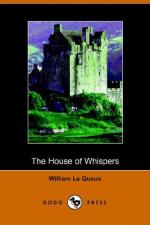Sadly she shook her head, but made no reply. He saw that a shadow had clouded her brow, that she still clung to her strange secret; and at length, when they retraced their steps back to the city, he reluctantly took leave of her, and half-an-hour later was speeding south again towards York and King’s Cross.
The opening day of the partridge season proved bright and pleasant. The men were out early; and the ladies, a gay party, including Gabrielle, joined them at luncheon spread on a mossy bank about three miles from the castle. Several of the male guests were particularly attentive to the dainty, sweet-faced girl whose charming manner and fresh beauty attracted them. But Gabrielle’s heart was with Walter always. She loved him. Yes, she told herself so a dozen times each day. And yet was not the barrier between them insurmountable? Ah, if he only knew! If he only knew!
The blind man was left alone nearly the whole of that day. His daughter had wanted to remain with him, but he would not hear of it. “My dear child,” he had said, “you must go out and lunch. You really must assist your mother in entertaining the people.”
“But, dear dad, I much prefer to remain with you and help you,” she protested. “Yesterday the Professor sent you five more bronze matrices of ecclesiastical seals. We haven’t yet examined them.”
“We’ll do so to-night, dear,” he said. “You go out to-day. I’ll amuse myself all right. Perhaps I’ll go for a little walk.”
Therefore the girl had, against her inclination, joined the luncheon-party, where foremost of all to have her little attentions was a rather foppish young stockbroker named Girdlestone, who had been up there shooting the previous year, and had on that occasion flirted with her furiously.
During her absence her father tried to resume his knitting—an occupation which he had long ago been compelled to resort to in order to employ his time; but he soon put it down with a sigh, rose, and taking his soft brown felt-hat and stout stick, tapped his way along through the great hall and out into the park.
He felt the warmth upon his cheek as he passed slowly along down the broad drive. “Ah,” he murmured to himself, “if only I could once again see God’s sunlight! If I could only see the greenery of nature and the face of my darling child!” and he sighed brokenly, and went on, his chin sunk upon his breast, a despairing, hopeless man. Surely no figure more pathetic than his could be found in the whole of Scotland. Upon him had been showered honour, great wealth, all indeed that makes life worth living, and yet, deprived of sight, he existed in that world of darkness, deceived and plotted against by all about him. His grey countenance was hard and thoughtful as he passed slowly along tapping the ground before him, for he was thinking—ever thinking—of the declaration of his French visitor. He had been betrayed. But by whom?




